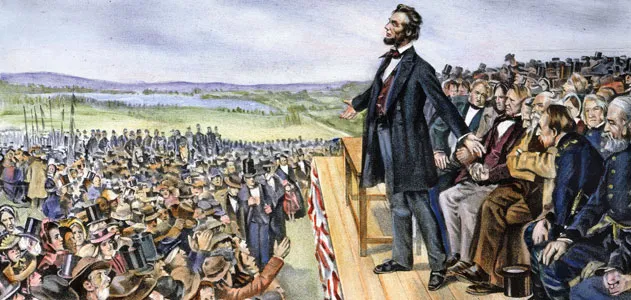
A self-taught lawyer, legislator, and a strong opponent of slavery, Abraham Lincoln is considered to be one of the greatest presidents of the U.S. Let’s relive the moment this American hero gave his monumental speech, popularly known as the “Gettysburg Address.”
On November 19, 1863, before an estimated 15,000 spectators President Abraham Lincoln dedicated a new soldiers National Cemetery at Gettysburg, Pennsylvania, U.S. Here he delivered a 272-word speech famously known as the Gettysburg Address, with the hope that it would guide the Nation through the war and towards healing.
Civil War & the Republicans
The Republican Party came into existence in 1854, seven years before the Civil War. Initially there were only two political parties in the U.S. namely the Whigs and the Democrats.
America was quickly expanding westward and the debate as to whether or not the new states should permit slavery was intensifying.
In the Northern states, manufacturing and industries formed the economic base, unlike the South where people depended on plantation farming of crops like cotton and tobacco for their livelihood. Agriculture heavily depended on black slave labour, and the Democratic Party, with its strong support in the South, was growing increasingly pro-slavery. But the Whigs were divided on the issue.
In 1854, unable to come to a solid resolution on the topic. the party collapsed. The former Whigs in the North came together to form a new party called the Republican Party. with abolition of slavery as their mission statement.
By 1860. this party established a strong foothold in the North. enough so that its member Abraham Lincoln. won the 1861 presidential elections.
This led to 11 Southern states breaking away from the union to form the confederate states of America. The Northern states decided to fight to keep the union together and the Civil War began. The result was, victory for the North and abolition of slavery nation-wide.
The Battle of Gettysburg
One of the bloodiest battles fought during the American Civil War took place in Gettysburg from 1st to 3rd July 1863. It claimed the lives of thousands of soldiers from both sides. The union’s victory here marked a turning point of the war, which officially ended in 1865.
The Address & The Greek Influence
According to literary research done on this piece, Lincoln’s elegiac speech at Gettysburg was modelled on the ancient Greek politician and general Pericles’ epitaphios logos (Athenian funeral speech). Even though his address was brief (in comparison to the Greek format), he still successfully managed to encapsulate the essential reference to the circle of life (as birth, death, and rebirth).
“Fourscore and seven years ago our fathers brought forth, on this continent, a new nation, conceived in liberty, and dedicated to the proposition that all men are created equal.” (excerpt from Gettysburg Address)
The Gettysburg Address begins with a recollection of the Declaration of Independence (1776) and the birth of America. It alludes to the struggles of the founding fathers who built this nation on the principles of universal equality and freedom.
Paying his homage to the deceased, he then proceeds to declare that the thousands lost to death on this battlefield have replenished the American soil with their selfless sacrifice. This sacrifice has not only prolonged the nation’s life, but also presented it with a fair chance of renewal.
Lincoln further reinforces the idea of rebirth when he says that this second chance must not be taken for granted, but incentivise us to work together “that the government of the people, by the people, for the people, shall not perish from the earth.” (excerpt from the Gettysburg Address)
Beacon of hope
With the struggle of war at its climax Lincoln’s speech was a beacon of hope for the thousands who were gripped by the feeling of impending doom. It revived the national ideals of freedom, and justice amid circumstances that had torn the country into pieces.
Since delivered this speech in particular has gone on to become one of the most powerful statements in the English language. Its brevity and intelligent word play has enabled it to cement its place as one of the most important expressions of liberty and equality.
DID YOU KNOW?
1. While giving this iconic speech the President was interrupted five times with the audiences’ applause.
2. Edward Everett (the featured speaker for the event) immediately afterward wrote to Lincoln: “I wish that I could flatter myself that I had come as near to the central idea of the occasion in two hours as you did in two minutes.”
Picture Credit : Google




